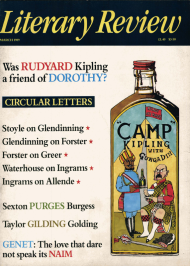Patrick Taylor–Martin
Seymour-Smith of the Sun
Rudyard Kipling
By Martin Seymour-Smith
Macdonald 373pp £16.95
Rudyard Kipling was both a writer and an important public figure, as likely to be seen in the company of his friend King George V or speaking at a recruitment rally as among his fellow writers. During his lifetime – in progressive circles, at least–he came to be regarded as no more than a crude and vulgar Imperialist, a kind of literary Cecil Rhodes. But there was always more to him than that – as George Orwell made clear in a pioneering essay of 1941. Since Orwell’s time, there have been many reassessments and Kipling’s literary reputation now stands as high as it has ever done.
By nature, Kipling was an outsider, turning down a knighthood, the Laureateship and even the O M. His daughter, Mrs George Bambridge, who died in 1976, guarded his posthumous reputation fiercely. Having given the second Lord Birkenhead permission to write a biography shortly after World War II, she was so

Sign Up to our newsletter
Receive free articles, highlights from the archive, news, details of prizes, and much more.@Lit_Review
Follow Literary Review on Twitter
Twitter Feed
Under its longest-serving editor, Graydon Carter, Vanity Fair was that rare thing – a New York society magazine that published serious journalism.
@PeterPeteryork looks at what Carter got right.
Peter York - Deluxe Editions
Peter York: Deluxe Editions - When the Going Was Good: An Editor’s Adventures During the Last Golden Age of Magazines by Graydon Carter
literaryreview.co.uk
Henry James returned to America in 1904 with three objectives: to see his brother William, to deliver a series of lectures on Balzac, and to gather material for a pair of books about modern America.
Peter Rose follows James out west.
Peter Rose - The Restless Analyst
Peter Rose: The Restless Analyst - Henry James Comes Home: Rediscovering America in the Gilded Age by Peter Brooks...
literaryreview.co.uk
Vladimir Putin served his apprenticeship in the KGB toward the end of the Cold War, a period during which Western societies were infiltrated by so-called 'illegals'.
Piers Brendon examines how the culture of Soviet spycraft shaped his thinking.
Piers Brendon - Tinker, Tailor, Sleeper, Troll
Piers Brendon: Tinker, Tailor, Sleeper, Troll - The Illegals: Russia’s Most Audacious Spies and the Plot to Infiltrate the West by Shaun Walker
literaryreview.co.uk